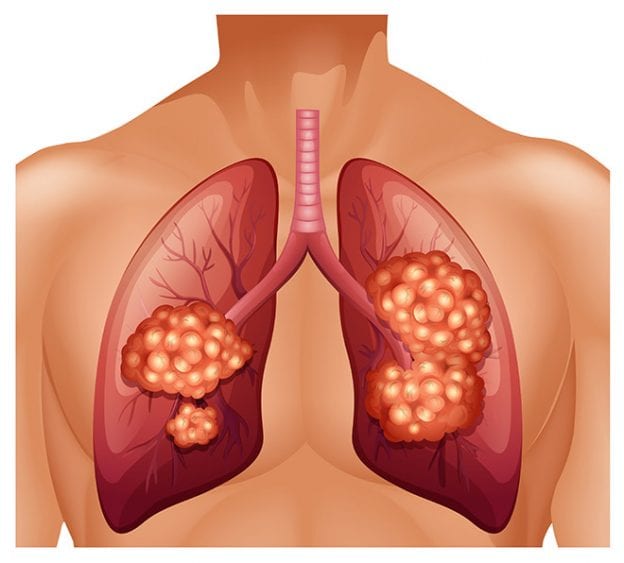
Dependence on the XPO1 protein
Since mutated RAS genes have been implicated as a key factor in approximately one-third of cancers, in 2014, the NCI (National Cancer Institute. USA) launched a special initiative aimed at better understanding the biology of these genes and, in doing so, fostering new approaches to treat RAS-fuelled cancers.
The RAS Initiative (which did not fund this specific study) is supporting a number of research programmes, including a recently launched effort that is supporting research to develop new approaches to identify synthetic lethal relationships in cancers with KRAS mutations.
Researchers have identified a potentially critical weakness in lung cancers that have mutations in the KRAS gene, a cancer-promoting genetic alteration that has been shown to be almost impossible to tackle therapeutically.. Moreover, the research team demonstrated that a drug already being tested against other cancers could successfully exploit this vulnerability in KRAS-mutant lung cancer cell lines and mouse models of lung cancer.
The weakness lies in the KRAS mutant lung cancer cells' dependence on a protein, called XPO1, that helps launch molecules involved in important cellular functions from the cell nucleus into the surrounding cytoplasm. The XPO1 inhibitor shrunk tumours in several different mouse models of non-small cell lung cancer (NSCLC) - the most common form of lung cancer - with KRAS mutations.
The results of the study, said lead researcher Jimi Kim, Ph.D., of the University of Texas (UT) Southwestern, and her colleagues, suggest that "... the study is a "very important study," and that it is "a very important one.XPO1 inhibitors are a promising therapeutic strategy for a large group of lung cancer patients.
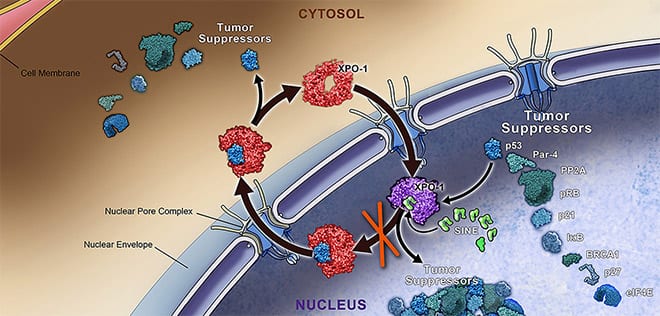
The study was published on 6 October in Nature.
In search of synthetic lethality
The RAS gene family - which, in addition to KRAS, includes NRAS and HRAS - is among the most important genes in the oncogenes most studied.
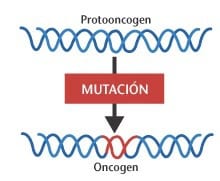
However, efforts to develop therapies that directly target Ras mutant proteins in tumours have been hampered by several factors, including their complex biology and their unique structural and biochemical properties.explained Ji Luo, Ph.D., of the Laboratory of Cancer Biology and Genetics at NCI's Center for Cancer Research.
KRAS mutations are present in the tumours of approximately 25% of NSCLC patients.. Patients whose tumours have these mutations often have a poor prognosis, and even if their cancer responds to initial treatment with chemotherapy, the disease almost invariably returns. So finding safe and effective ways to treat KRAS-mutant tumours in patients with NSCLC is a high priority.
One way researchers are trying to overcome the difficulty of directly targeting RAS proteins is to seek a goal: to identify and target the molecular partners or signalling pathways on which they are highly dependent to carry out their tumour-promoting functions.. Remove the partner, and a chain reaction is created that leads to the death of the cancer cells, a concept known as "synthetic lethality".
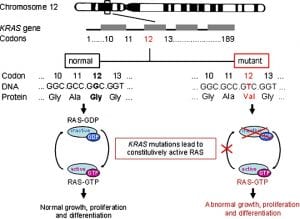
UT Southwestern researchers used this synthetic lethality approach in their study. Based on a comprehensive genomic analysis of more than 100 high-quality NSCLC cell lines, the research team selected the 12 lines that best represented the genomic composition of NSCLC, explained the study's senior author, Michael White, Ph.D. They then performed a synthetic lethality "screen" on these 12 cell lines, systematically inactivating or silencing genes to identify those genes whose inactivation led to cell death in cancer cell lines that had KRAS mutations (but not those with unmutated KRAS).
From these experiments, the researchers discovered that a group of genes involved in the transport of molecules out of the cell nucleus was necessary for the survival of KRAS-mutated NSCLC cells.
Starting with XPO1
The reliance of tumours with KRAS mutations in these so-called nuclear export proteins led the team to XPO1. This was not because the screen identified XP01 as more important than other nuclear export proteins, explained study co-author Pier Paolo Scaglioni, MD, but rather because, By "fortunate circumstance", an XPO1-targeted drug, KPT-330, has already been developed and is being tested as a treatment for several types of cancer.
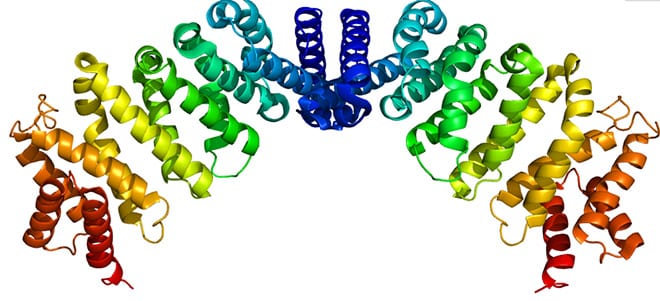
The researchers found that the drug (as well as an earlier version of the drug) killed most NSCLC cancer cell lines. KRAS mutant and shrunk tumours in different types of KRAS mutant NSCLC mouse models, including two models that closely replicate how the cancer behaves in humans.
The mutant KRAS mutant's reliance on the nuclear export pathway is "very unexpected," said Dr Luo, who was not involved in the study. The finding, he continued, "illustrates that there may be other unanticipated targets that can be exploited in KRAS mutant cancers".
The research team also identified why targeting XPO1 can cause cancer cells with KRAS mutations to die. Blocking XPO1 activity, they showed, disrupts a signalling pathway controlled by a transcription factor, NFκ B, that affects the activity of many genes involved in promoting cell survival. By interfering with the survival signals provided by NFκB, Dr Scaglioni said the KRAS mutant cancer cells soon die..
But not all NSCLC KRAS mutant cell lines and animal models responded to treatment with KPT-330. The UT Southwestern team was able to trace this resistance to a common factor: a mutation in the FSTL5 gene. This mutation, they found, leads to overexpression of the protein YAP1, another transcription factor that recent studies have suggested may fuel tumour growth. Blocking YAP1 in KRAS-mutant NSCLC cell lines, they showed, could overcome resistance to the XPO1 inhibitor.
Identifying resistance mechanisms as early as possible in the development of new targeted therapies is important, Dr Luo said. He cited the example of FDA-approved drugs that target tumours with mutations in the BRAF and EGFR genes. Although many patients initially respond well to these drugs, resistance almost invariably sets in.
So having data on resistance "can help us stay one step ahead of the tumour," he continued. "It can help identify potential strategies to target these resistance mechanisms, or prevent resistance from emerging in the first place."
Human evidence and future directions
Karyopharm Therapeutics, which developed KPT-330 (also known as Selinexor), is already testing the drug in a series of early-stage clinical trials in patients with blood cancers and solid tumours.
Based on the results of this new study in cell lines and mouse models, the company plans to launch an early trial early next year testing KPT-330 in combination with the chemotherapy docetaxel in patients with advanced NSCLC that has KRAS mutations.
While these new results are important and researchers are beginning to make some progress in developing methods to directly target RAS, Dr Scaglioni said research to identify synthetic lethal partners for this common oncogene will remain a priority.
Dr Luo agreed, noting that a synthetic lethal approach has important advantages. By casting a wider net, he continued, researchers can identify more processes involved in cancer promotion "that are unexpected and potentially targeted for therapy".
Complementary Cancer Treatment Unit of Biosalud Day Hospital
The tadjuvant cancer treatment Biosalud Day Hospital was created with the idea of complementing the treatment of any cancerous disease according to the techniques of Biological Medicine, enhancing the effects of Conventional Medicine and without side effects or contraindications.
The techniques we use are compatible with conventional treatments. The aim is to join forces in order to have the best possible chance of overcoming the situation.
That's why we're always on the lookout for new research on cancer, such as this one, which shows that cancer is the most common form of cancer in the world.XPO1 protein inhibitors are a promising therapeutic strategy for a large group of lung cancer patients.".
Source: cancer.gov


6 thoughts on “Cáncer de pulmón y mutaciones del gen KRAS”
I would like to know more about lung cancer. I am a chemotherapy patient.
Good morning, this is a general information blog associated with the activity of BIosalud Day Hospital, it is not an online clinic. We recommend that for any queries you may have, you should see your specialist. Best regards
Good morning, my father has lung cancer with Kras mutation, how can I volunteer for the targeted therapy experiment?
Thank you for your interest in Biosalud Day Hospital. Our medical team will send you an email shortly to the contact address you provided.
Hello,
Like the previous comment, my father also has lung cancer with Kras mutation, how could he participate in your treatment?
Greetings,
Catherine
We recommend that you contact our patient care team and our medical team via the form on our website. https://biosalud.org/contacto/
Comments are closed.